Cuba's Unspoiled Tropical Reefs
Air Date: Week of February 6, 2015
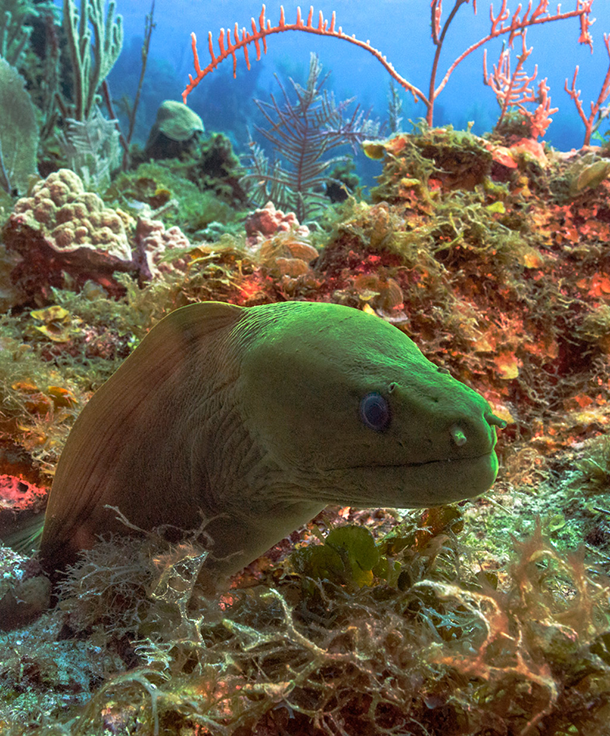
Reef Libre: The Last, Best Reefs in the World is diver and photographer Robert Wintner’s most recently published book. (Photo: courtesy of Robert Wintner)
Cuban reefs are some of the most beautiful and well-preserved in the world, partly due to the country’s economic isolation. But with relations between the US and Cuba thawing, diver and photographer Robert Wintner had the chance to dive Cuba’s unspoilt reefs and has detailed the experience in his new book Reef Libre: The Last, Best Reefs in the World, which he discussed with host Steve Curwood.
Transcript
CURWOOD: It's Living on Earth. I'm Steve Curwood. One of the biggest surprises at the end of 2014 was the unexpected thaw in US-Cuba relations. Cuba, a mere 90 miles to the south at its nearest point, has been a thorn in American flesh for over 50 years. But tough economic sanctions, relentless propaganda and deep hostility from many Cuban exiles in Florida have not changed the island’s brand of communism. For many Americans without direct family ties, one hope of renewed ties with Cuba is the chance to visit another jewel of the Caribbean, blessed with glorious beaches and weather. And for divers, there is now a better chance to see its breathtaking and unspoiled coral reefs -- and most fortuitously, a new book called “Reef Libre” that looks at just those famed reefs arrived in our office. It’s written by Robert Wintner, a.k.a. Snorkel Bob, who’s on the line now from the island of Maui, in Hawaii. Aloha, Mr. Wintner.
WINTNER: Aloha to you.
CURWOOD: Now, your book is very timely. Come on, tell me...you got some kind of tip off on this political thaw?
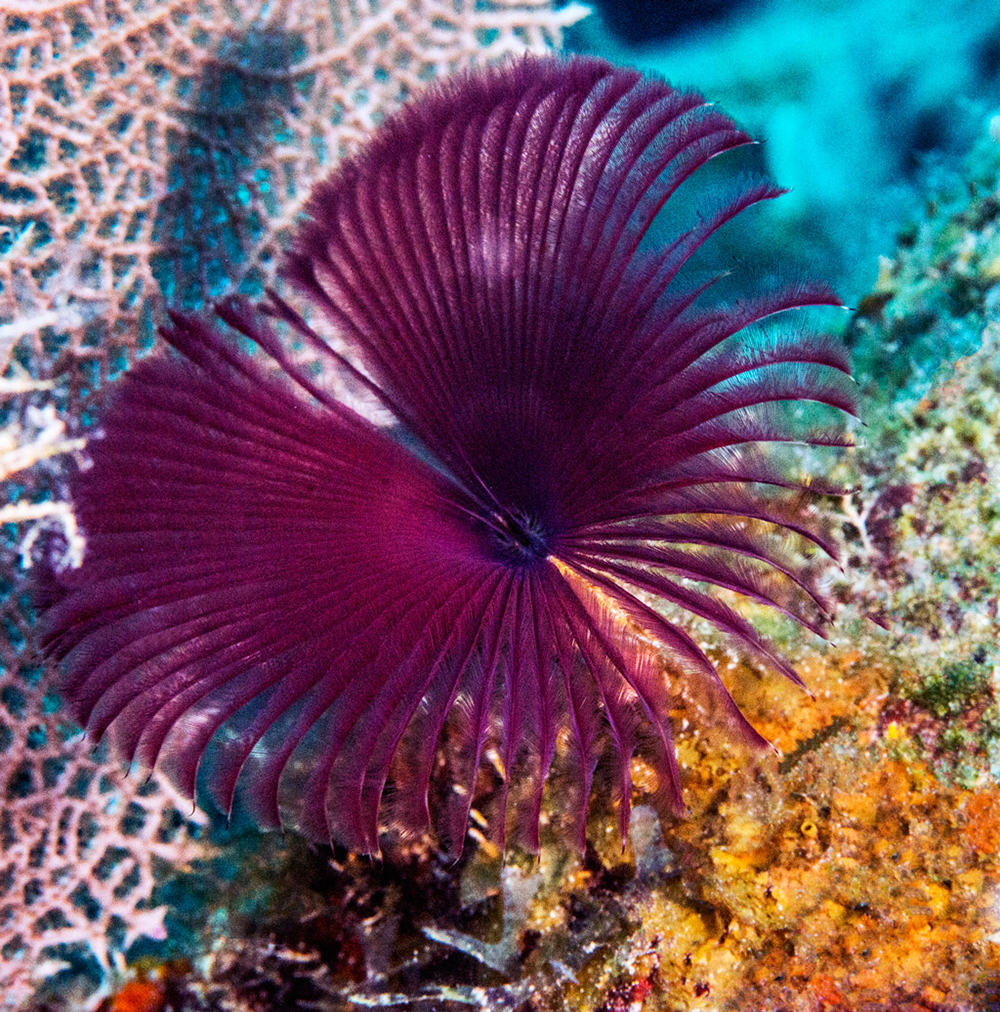
The reefs at Jardines de la Reina are nothing if not showy: a filter-feeding purple sea fan maximizes its surface area with an intricate network of connected branches. (Photo: Robert Wintner)
WINTNER: Well, you know I think it was not anything that was very complex or unpredictable. I will admit our timing was superb. I thank Neptune for that. We got word of this particular reef system was being called the last best reef system in the world, and the three qualifiers for that rating were 100 percent biodiversity, that means all the species that were ever there are there now, and in fact some they thought were extinct, 100 percent coral cover and 100 percent host of apex predators, and that was the key right there to restoring these reefs to healthy conditions. No natural system can survive intact without apex predators, that's what allows every level of the food chain beneath it to be at optimum balance, and the glaring example in the world today is Cuban reefs, our Jardines de la Reina. That's the ocean people talk about, that the world used to have, that we used to love. It's there in in Cuba.
CURWOOD: So you heard about these reefs there in Cuba. You decided you got to go and get on a plane and get off at Havana. Talk to me a bit about some of the places that you dive in Cuba.
WINTNER: Well, we dove in Havana for a baseline. I wanted to get a measure of reef conditions in an urban setting. Urbanity is the biggest challenge to wildlife and wildlife habitat. We went from there to Cayo Largo. The problem with Cayo Largo is they have a 600-room hotel and they were cleaning the sheets and towels with phosphate based detergents - direct drive graywater right on to the reefs. So there is no snorkeling at Cayo Largo. The near shore shallow reefs at Cayo Largo are dead. They don't exist. When we went to deeper water and dived, and if we got either side of the outflow currents then the reefs were beautiful, as beautiful as anywhere in Cuba, and then we come to Jardines and it was just beautiful.
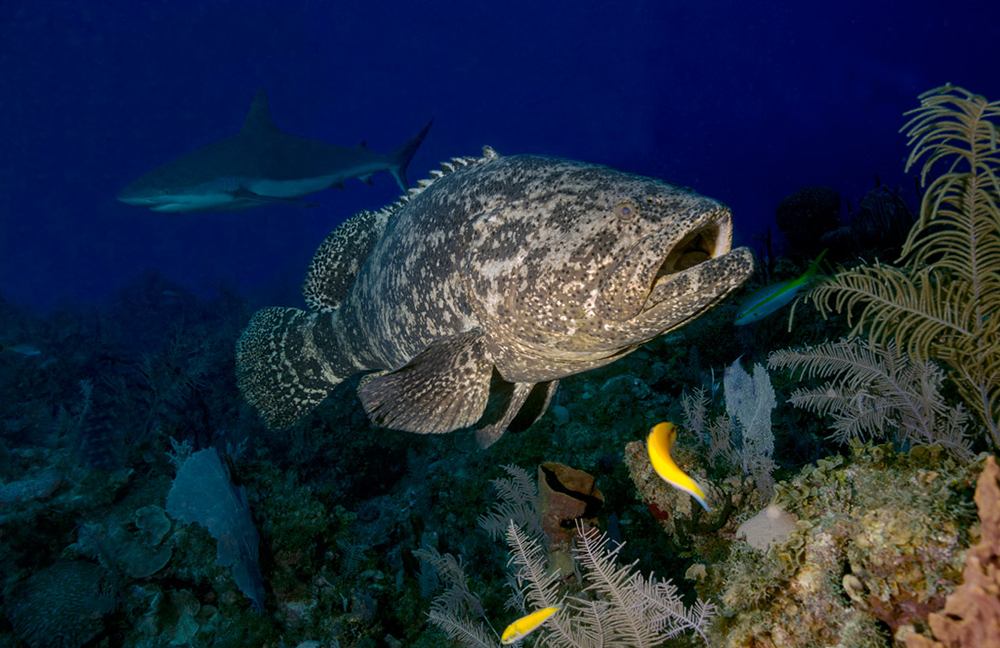
Thanks to the fishing ban, which has been in effect in for the past several decades, grouper and other apex predators are plentiful on Cuban reefs. Wintner says that grouper used to be abundant in Hawaii as well, but fishing and tourism impacts have reduced the Hawaiian grouper population. (Photo: Robert Wintner)
CURWOOD: Robert, I don't want to sound dismissive when I say this, but at least half of your book consists of pictures of some of the most glorious assortment of brilliantly colored exotic and wondrous fish all taken in Cuba. How many of them are truly unique?
WINTNER: Let me give you a glaring example. Most people who live in Hawaii and especially people who visit, all don't realize that Goliath Groupers once swam in abundance in Hawaii, and today you will find zero. Most reefs in the world, most reef areas, reef systems have zero Goliath Groupers and that's because they get up to 400 or 500 or 600 pounds, and that's a lot of meat on the table, and they are all gone. To put it in a nutshell, one day Fidel Castro said, "No mas." The big rule that he imposed was no more killing the sharks.
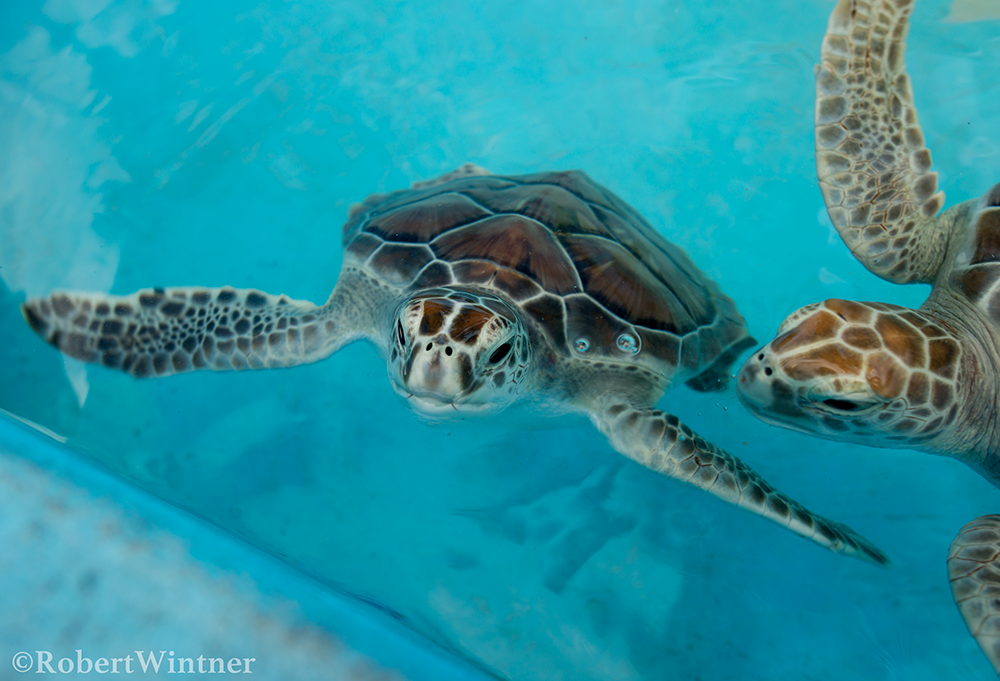
Run-off pollution from a large hotel on Cayo Largo’s beach has severely damaged its near-shore shallow reefs. In the deeper water outside of the outflow currents and pollution, the reefs remain rich in sea life, including this pair of sea turtles. (Photo: Robert Wintner)
WINTNER: Everybody should be aware now of the shark fin soup issue, and the fella I interviewed in Cuba relayed this information and I said, "But why were your sharks threatened? You're nowhere near Asia," and he said, "We ate our sharks. They were our staple protein." And whatever you want to say about capitalism or communism becomes incidental to the fact that Fidel Castro one day said, "No mas," on shark killing; the sharks came back. Now, with the sharks are the big Groupers, the biggest Grouper species are Goliaths, and they're all over Jardines de la Reina.
CURWOOD: Now, Robert you make a point of contrast in Hawaii where you live and where you have your business, Snorkel Bob, with Cuba. Talk to me about what Cuba has going for it here.
WINTNER: In Hawaii, we have a Department of Land and Natural Resources that is mandated for most efficient extraction of ocean resources, whereas they should be mandated for conservation and they're not, and the example that's most touching to me is the wild west situation with the aquarium trade in Hawaii and the massive extraction and trafficking in reef wildlife for the pet trade. Cuba's reef management is focused on conservation and redemption.
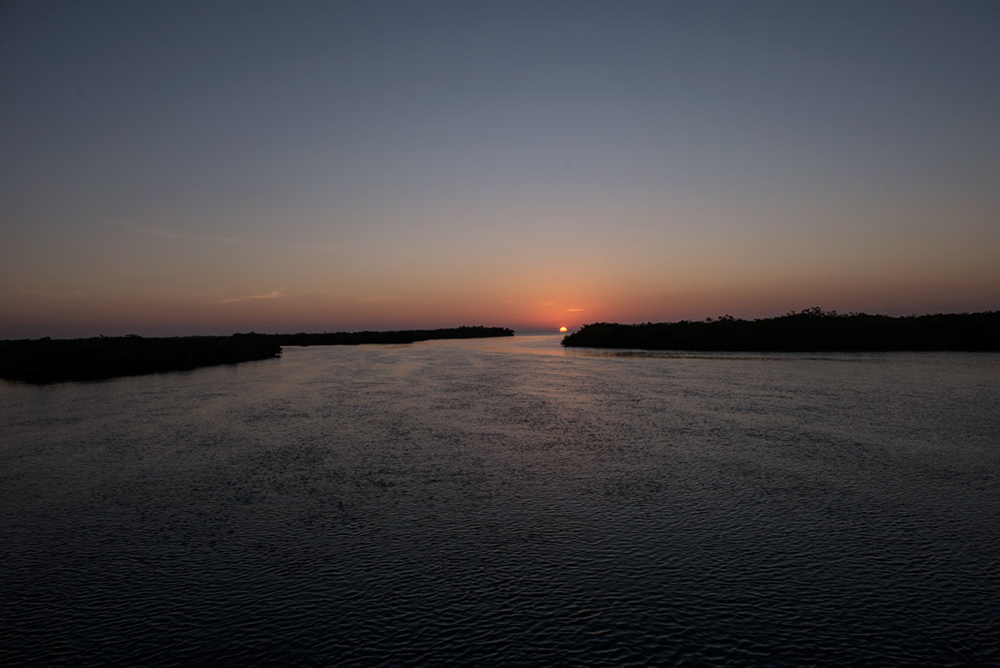
Jardines de la Reina, “The Gardens of the Queen,” is part- mangrove forest, part- coral reef. (Photo: Robert Wintner)
WINTNER: Our big measure in Havana was the presence of what we call feather dusters. They are a polychaete worm. They bore into the coral and then they filter feed with these amazingly beautiful feather duster filter tails. In Hawaii, at a place called Kaneohe Bay on Oahu, the feather dusters all went to aquarium extraction. There none left. On Havana reefs, we saw feather dusters in the hundreds, in fact, probably in the thousands; we saw them in clusters. They were everywhere and it's an indicator that these reefs are...that they have healthy water quality and they're also un-oppressed with any form of extraction.
CURWOOD: How important in your view is the home aquarium business and its impact on coral reefs?
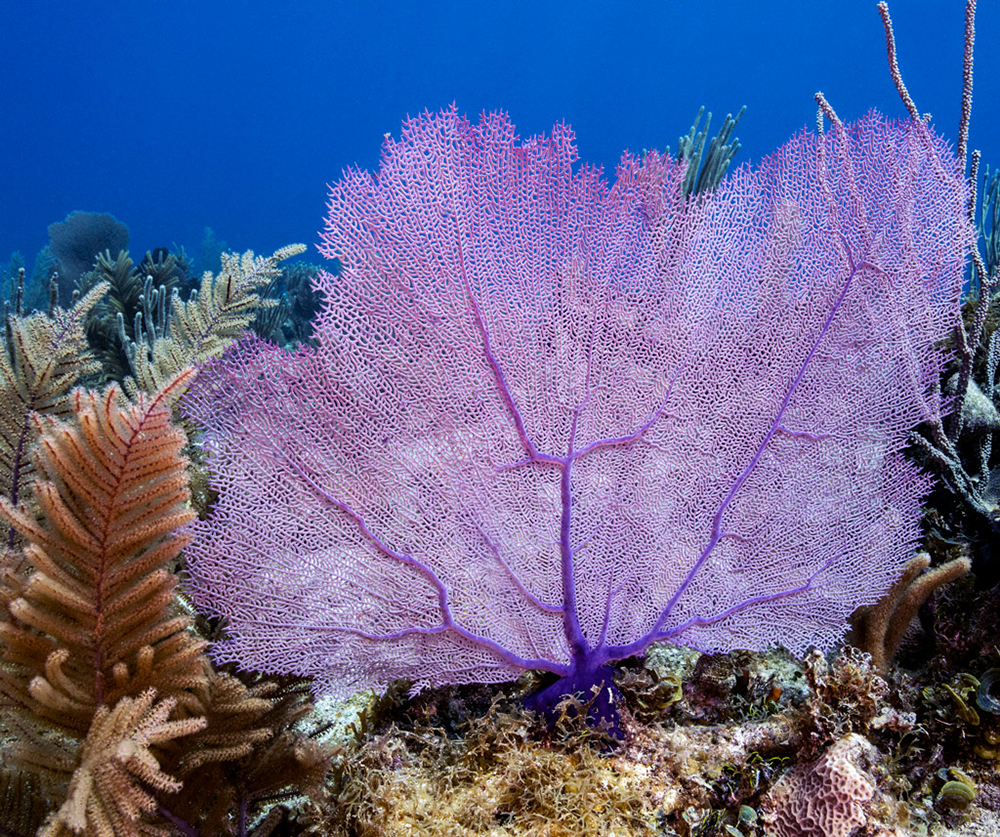
The reefs at Jardines de la Reina are nothing if not showy: a filter-feeding purple sea fan maximizes its surface area with an intricate network of connected branches. (Photo: Robert Wintner)
WINTNER: It's huge. It's devastating reefs around the world. It's one of the last vestiges of trafficking in wildlife for the pet trade. Most people assume that somebody somewhere is growing those fish. They're not. This is wildlife taken from reefs. One of the biggest debacles in ocean conservation in our time is the Lionfish invasion of the Atlantic and Caribbean Sea, and that was brought to by the aquarium trade. The Lionfish did not swim there. There are now more Lionfish in the Atlantic and Caribbean than all other species combined.
CURWOOD: What exactly happened with the Lionfish and the aquarium trade?
WINTNER: Lionfish are voracious predators. They occur naturally in the Pacific and Indian oceans and in those places where they occur naturally, predators eat them. In the Atlantic and the Pacific, the big predators are mostly the Groupers and the sharks, Moray eels and Barracuda, and when they would try to eat the Lionfish, Lionfish have big spines in their dorsal fins and are full of them, and if one of them stings you, you will not forget it. It will ruin your day. And so when the predators would go to eat Lionfish they'd get stung and they wouldn't eat them anymore.

In 1996, Fidel Castro declared Jardines de la Reina a Marine Park, banning all commercial fishing and ensuring that the reef would remain inaccessible to all but a thousand tourists each year. (Photo: Marcelo Montecino; Wikimedia CC BY-SA 2.0)
WINTNER: In Cuba, they catch the Lionfish and they despine them, which is tricky business. After they despine them, then they would feed them to the sharks and Groupers and Morays and I am told that the sharks were the best students. Once they got a taste for the Lionfish, they began eating them on their own - the live ones. In Jardines de la Reina, the divers used to go out and spear 40 to 50 Lionfish per dive. Now they go out and see two or three because the sharks there have learned to add Lionfish to their diet. So the problem's not going to go away, but they think it has stabilized now and it's under control.
CURWOOD: Robert, to what extent do you think that the lack of commercialism in Cuba has helped protect underwater life?
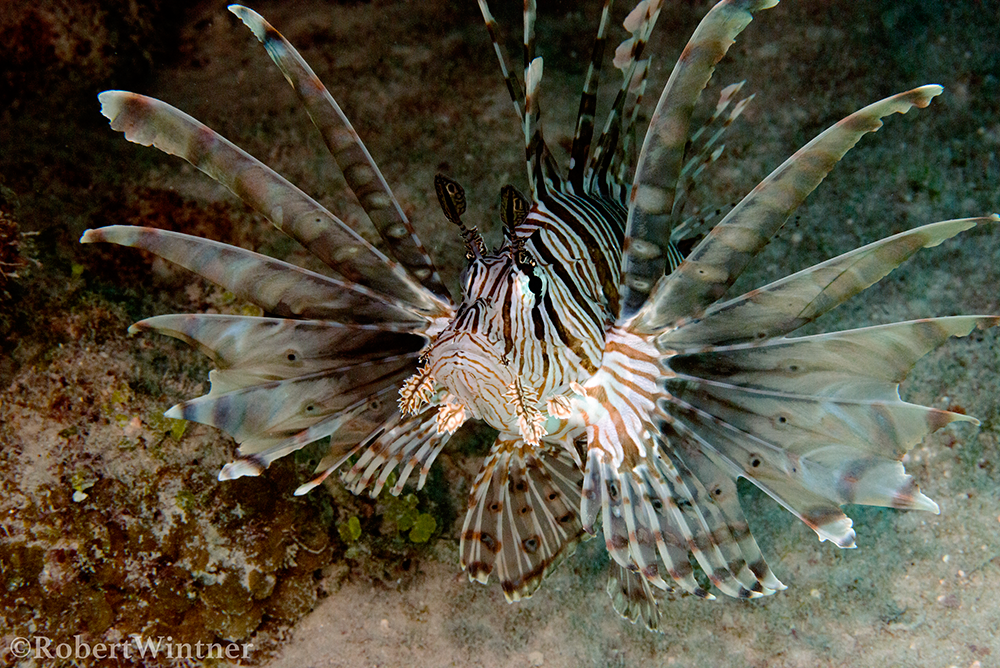
The lionfish may be spectacularly decked out with spines and stripes, but it’s a scourge of coral reefs to which it has spread, thanks to the aquarium trade. While natural predators in the Pacific and Indian oceans keep populations in check, invasive lionfish threaten native reef fishes in the Atlantic and Caribbean. (Photo: Robert Wintner)
WINTNER: The fella whom I interviewed the most, Fausto Dinetti was a diver at Jardines for six years and then they sent him up to Cayo Largo to try to redeem those reefs, and I said to him --we talked quite a bit about commercialism and what's going to save Jardines when the change comes -- my question to my friend Fausto is, "You have now, right now, a thousand people per year, which is very low traffic visiting Jardines, it's expensive and it's hard to get there." I said what's got to keep that from going to 3,000 when tourism opens up?" He says, "We won't let it get any bigger." I said, "Let me give you an example. If this was Hawaii, here's what would happen. A developer would come in and say, 'I have a proposition for you. I'm going to develop hotels, condominiums, timeshare resorts, and it's going to be jobs for people and everybody's going to be prosperous and here's the bottom line: the reefs not only won't be harmed by this, they'll be even in better shape when we are done,'" and Fausto's nobody's fool and he gave me a scowl and he said, "That will not happen here." And I said, "How can you be so sure. I've seen beautiful areas in Hawaii and elsewhere go the way of development, and once it begins you don't get it back."
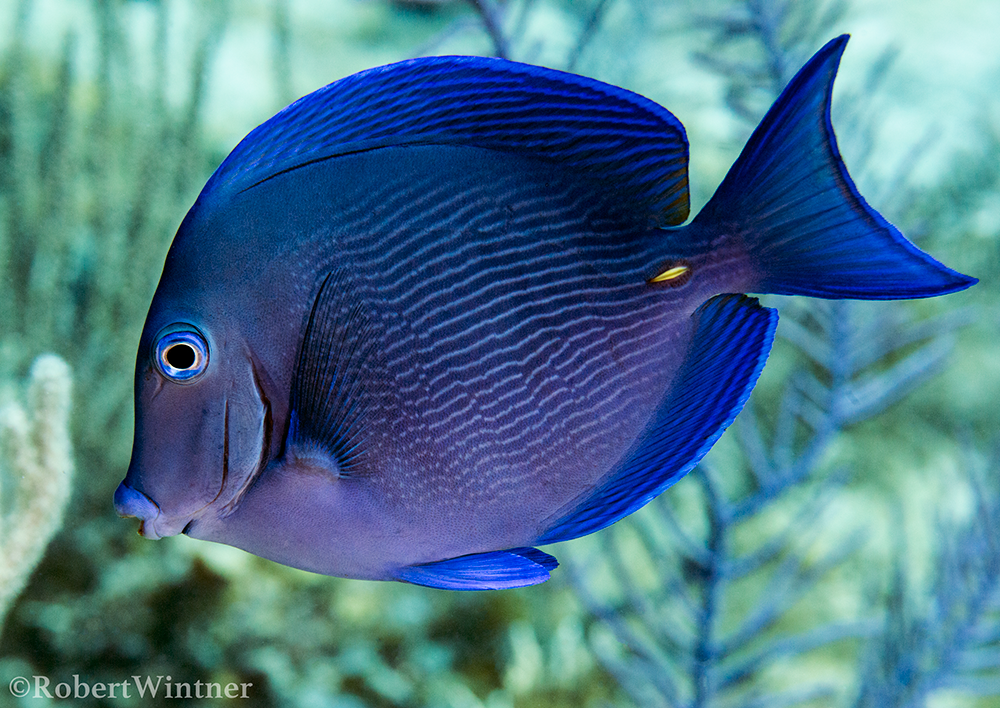
A mature Atlantic blue tang begins life as an almost completely yellow juvenile, but by the end of its first year of life, the fish is sexually mature and nearly entirely blue. (Photo: Robert Wintner)
CURWOOD: What needs to be done by the international community in your view to protect these reefs off of Cuba?
WINTNER: I think that Jardines de la Reina could qualify as a world heritage site and end the potential of development at Jardines, and keep it a gem and a jewel and hard to get to, and hard to get a place to be there. And if you want to go you'll still go. A world heritage site I think would be the number one thing to happen to Jardines de la Reina and it should happen.
CURWOOD: How much do the Cuban people care about this resource?
WINTNER: That is the tough question because the Cuban people are so hungry. It's the same as asking how much do poor people all over the world care about their natural treasure if they're not seeing any part of it convert to dollars or money for them. In Cuba, there are two realities, two cultures, and two economies. A surgeon, a heart surgeon in Cuba makes $40 a month. So you tip a cabdriver $5 bucks, well, that's huge. That's a week’s pay for a surgeon.
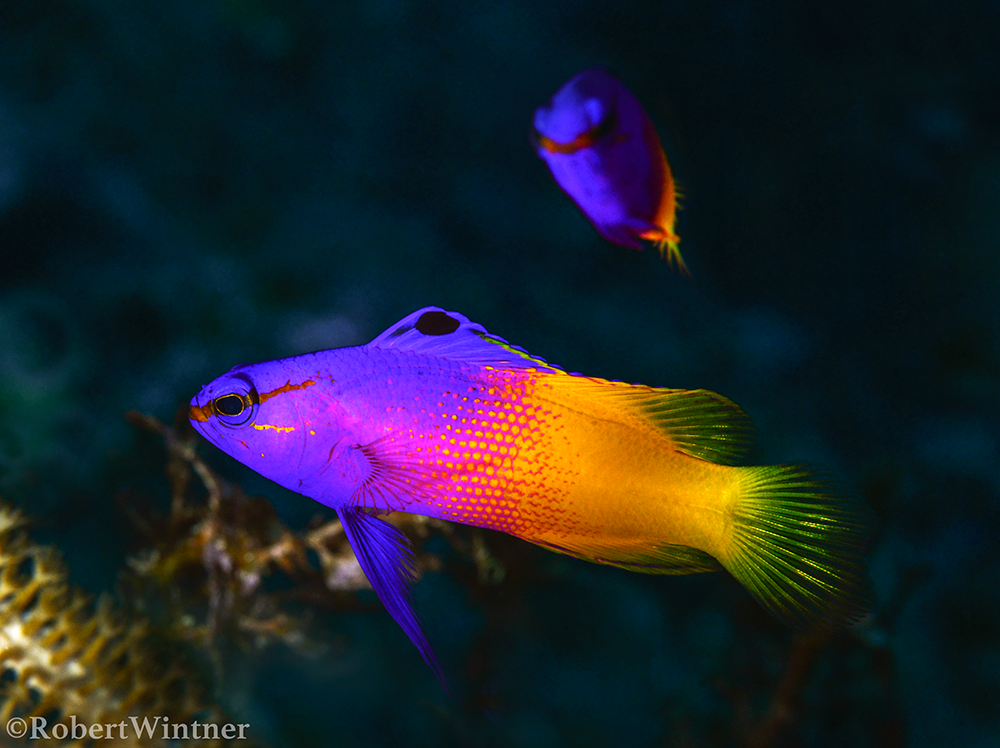
Fairy basslets can grow to three inches long and are known to swim upside-down along cave ceilings and ledges. (Photo: Robert Wintner)
WINTNER: People who have jobs in tourism are exposed to people like us who can tip $5 or $20 or $50 and the other culture in Cuba has no access or exposure to tourists, and they have nothing. Nothing, and it's difficult to imagine a life with nothing and maintaining conservation values. It's easy to love these treasures once you have a little food in your belly and it's a big challenge getting to that point.
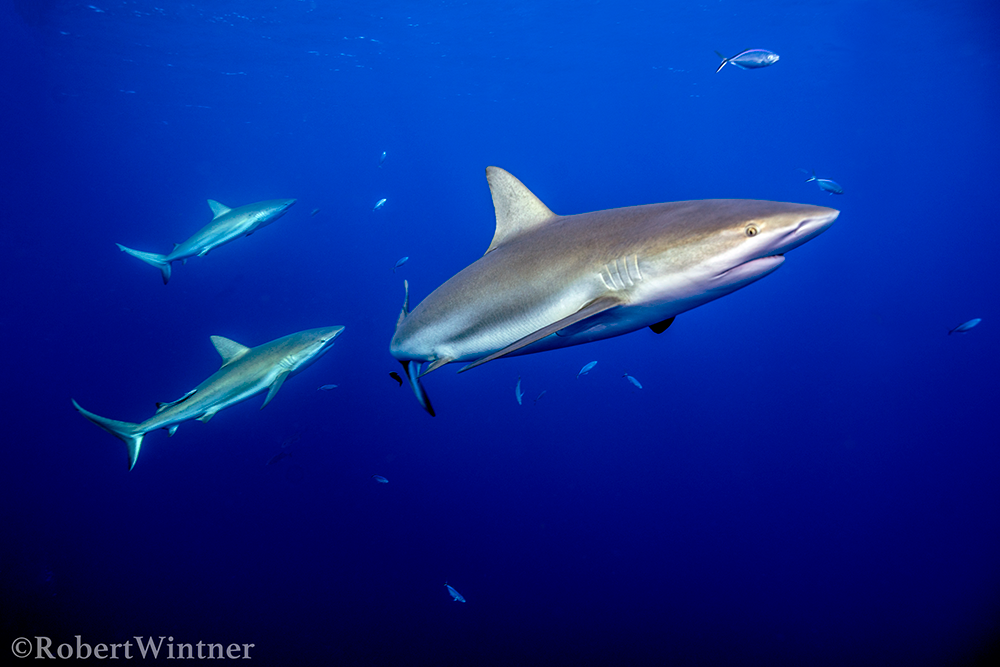
Sharks are plentiful in Cuban waters these days, but their numbers were greatly reduced prior to Fidel Castro’s fishing ban since Cubans relied upon shark meat as a primary source of protein. (Photo: Robert Wintner)
WINTNER: In Cuba when the sharks and the reefs started to come back they wanted to tag the sharks and they discovered this thing called shark spinning. All fish have what's known as a lateral line, and in that lateral line are all its senses and senses beyond the five senses we're familiar with. A fish knows, a fish senses using its lateral line. And on a shark, the lateral line converges right under the shark’s nose, and our friend Michael Echemendia was our main guide on board Jalcon at Jardines said that if you hold the shark’s nose right in the palm of your hand and then you play the piano -- and he tapped his fingers lightly -- it would put them to sleep and that would make the shark docile so they could tag them.
WINTNER: Meanwhile they also discovered that they could do whatever they wanted with that shark and so they would stand the shark on and tail up head down and spin it with the nose in the palm of his hand. And this was great entertainment for the tourists, and so when we showed up, one of the people on board said, "Shark spinning. We want to see shark spinning. And Michael said, "We don't shark spin anymore," and the guy who asked for it said, "Why not? I really...that's one of the things I was looking forward to." And he says, "Well, we have to compete in a world market." Boom! There's insight.
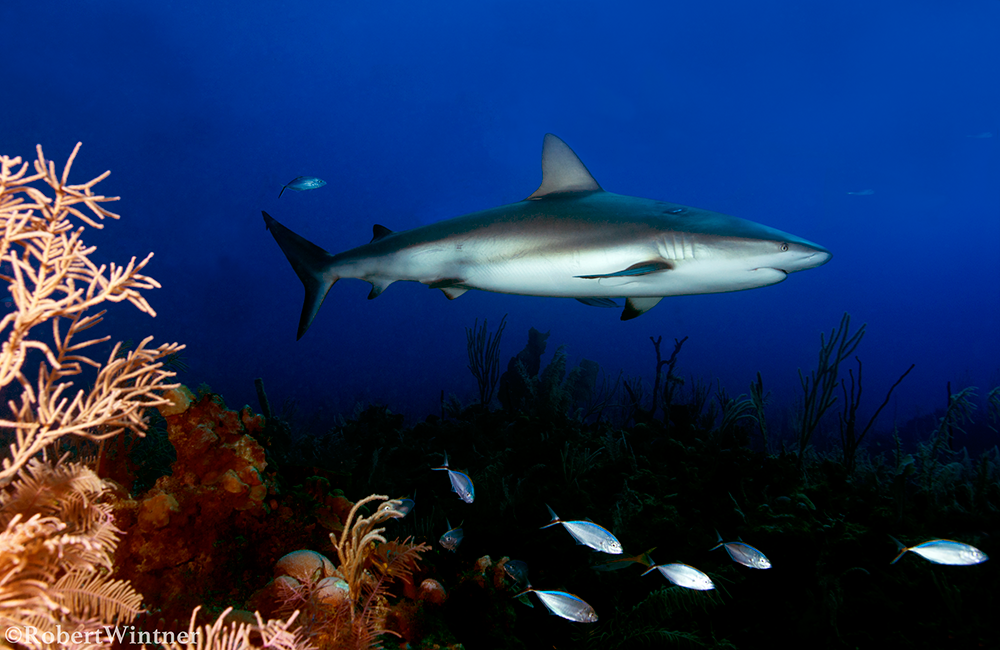
Wintner describes his close encounters with sharks in Cuba as “thrilling” rather than “terrifying.” He befriended a shark he named “Scarback.” (Photo: Robert Wintner)
WINTNER: There's communists aware of market competition and adapting to it. He said, "We have to compete in a world market and many people frown on shark spinning," and I, at that point said, "I want to thank you for not shark spinning because I'm one of those people who has a hard time with it. If you want to use it to tag sharks for productive benefit then that's fine, but to use it as a show for tourists, it's not fine." It was the right thing for him to say as far as I was concerned.
CURWOOD: Robert, what you hope your book does?
WINTNER: People have a general idea, they have a concept of reefs: reefs exist, yeah that's where fish live, and there's this colorful crusty stuff called coral. But until they see in detail, they just don't know. People think of fish and have for decades as something to roll up in a newspaper, something to have with tartar sauce.
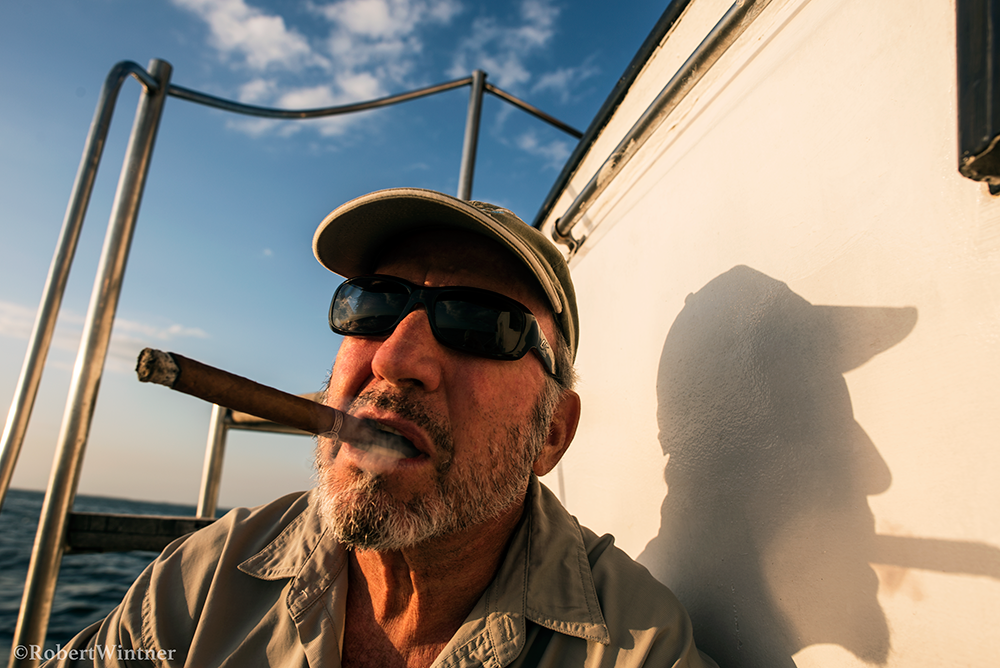
Robert Wintner, founder of Snorkel Bob’s shops throughout Hawaii, is a diver, photographer and author. (Photo: Keith Christie)
WINTNER: People have a hard time imagining cold-blooded gill-breathers as sentient beings. I got asked by a Taoism club in California once, "Can fish have a soul?" I said, "That's a perfectly humanistic question and I'd like to rephrase it: Can fish be a friend of mine? Oh, yeah." If you're out on a reef, and you're there more than once, the fish get to know you. We were able to identify certain sharks. There's one I nicknamed Scarback because she had a scar forward of her dorsal fin on the right side. She was very curious and did the normal feeding behavior, turning a circle around me and the radius got shorter and shorter. You know, by the fourth or fifth day we were so casual with shark company - I was out on my own one day and here came a shark, a huge shark right up to me and I looked - it was Scarback and I said, "Oh, it's you." And I thought, this is possibly complacence to a hazardous degree but it wasn't, and the shark familiarity was a great thing. In answer to the question, what can the book do? I think open people's eyes...not everybody can get onto a reef, and so the book is for those people and even those who do, often miss the detail, the engagement, the soulful contact that can occur there.
CURWOOD: Robert Wintner, or Snorkel Bob, is a diver, photographer, tour leader, sea life lover and author of the gorgeous book “Reef Libre”. Thanks so much for taking the time, Robert.
WINTNER: Thank you, Sir. I appreciate it.
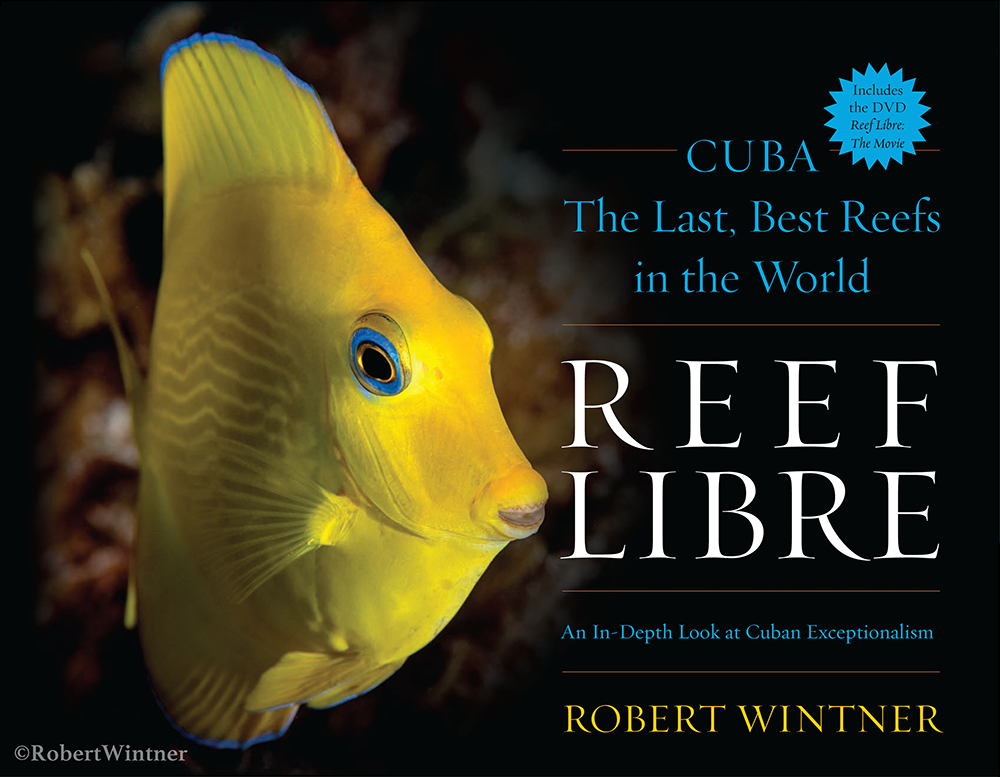
Reef Libre: The Last, Best Reefs in the World is diver and photographer Robert Wintner’s most recently published book. (Photo: courtesy of Robert Wintner)
Links
“For the Sea” PSA on reef etiquette
CBS 60 Minutes feature on Jardines de la Reina
Living on Earth wants to hear from you!
Living on Earth
62 Calef Highway, Suite 212
Lee, NH 03861
Telephone: 617-287-4121
E-mail: comments@loe.org
Newsletter [Click here]
Donate to Living on Earth!
Living on Earth is an independent media program and relies entirely on contributions from listeners and institutions supporting public service. Please donate now to preserve an independent environmental voice.
NewsletterLiving on Earth offers a weekly delivery of the show's rundown to your mailbox. Sign up for our newsletter today!
 Sailors For The Sea: Be the change you want to sea.
Sailors For The Sea: Be the change you want to sea.
 The Grantham Foundation for the Protection of the Environment: Committed to protecting and improving the health of the global environment.
The Grantham Foundation for the Protection of the Environment: Committed to protecting and improving the health of the global environment.
 Contribute to Living on Earth and receive, as our gift to you, an archival print of one of Mark Seth Lender's extraordinary wildlife photographs. Follow the link to see Mark's current collection of photographs.
Contribute to Living on Earth and receive, as our gift to you, an archival print of one of Mark Seth Lender's extraordinary wildlife photographs. Follow the link to see Mark's current collection of photographs.
 Buy a signed copy of Mark Seth Lender's book Smeagull the Seagull & support Living on Earth
Buy a signed copy of Mark Seth Lender's book Smeagull the Seagull & support Living on Earth

